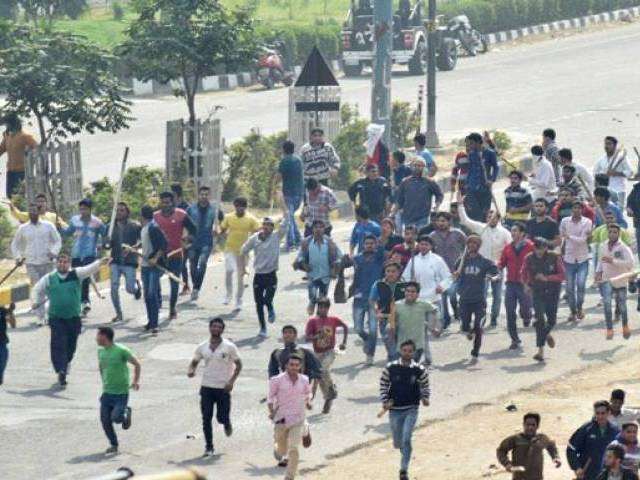Riots next door
The tensions within the Indian caste system are never far from the surface

Protesters run along a street during violent clashes with rival caste groups over access to jobs and education in Rohtak, northern India on February 19, 2016 PHOTO: AFP
The train and bus services between our two countries are a tenuous link. They are low volume and reflective of the bilateral tensions that inhibit so much in terms of people-to-people contact. Visa regulations on both sides are oppressively tight — although India has of late eased the visa regime for business travellers — but visiting artists, sportspersons and writers both ways can find themselves denied entry. The suspension of bus and train services is understandable, given the fluid situation in India, and the capacity for rapid spread that caste-related communal flare-ups have a tendency towards. A commentator on an international news channel remarked at the weekend that if you came to Mumbai today and compared it to the Mumbai of 20 years ago, you would believe that there had been deep and profound change. Not so, said the commentator. Whilst there is change on the surface, bright modernity, young people wearing fashionable clothes and a host of other details; beneath the surface there is very little that has changed, and the caste system still rules with the same rigidity it has for a thousand years. It does not adapt well to the needs of a fast-evolving world, and the dispute at the heart of the disturbances is around a caste quota system and the desire to ‘downgrade’ by the rural Jat caste. Expect no early solution, and idle buses and trains look at an uncertain future.
Published in The Express Tribune, February 23rd, 2016.
Like Opinion & Editorial on Facebook, follow @ETOpEd on Twitter to receive all updates on all our daily pieces.














COMMENTS
Comments are moderated and generally will be posted if they are on-topic and not abusive.
For more information, please see our Comments FAQ